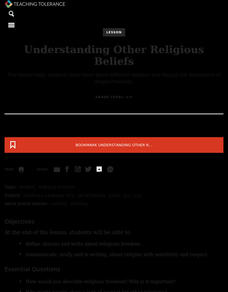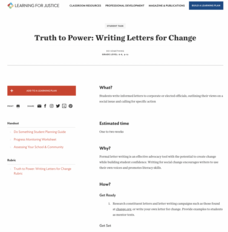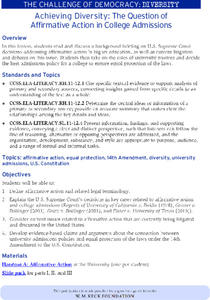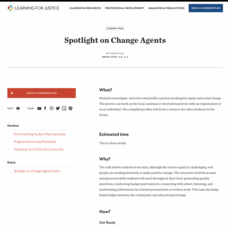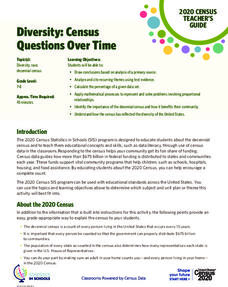Museum of the American Revolution
People of the Revolution
It's nothing new—America has always been a melting pot of cultures. The resource explores the diversity of individuals living in the American colonies during the Revolutionary War. Scholars examine artifacts and primary sources to...
Teaching Tolerance
Modern-Day Heroes: People Who Are Making a Difference
Not all superheroes wear capes. An engaging lesson delves into the world of modern-day heroes and activists for change. Academics learn there are many different ways to be a hero as well as explore what makes a person a hero. The...
Teaching Tolerance
Understanding Other Religious Beliefs
Learn what it means to respect others in an engaging instructional activity on religious beliefs. An inclusive resource focuses on understanding other religious beliefs, the right to freedom of religion, and the U.S. history of religious...
Teaching Tolerance
Dismantling Racial Caste
It's time to end racism. The final installment of the series encourages scholars to consider what is needed to ended the racial caste system in the U.S. Young historians complete group discussion, written prompt, and a hands-on-activity...
Teaching Tolerance
Parallels Between Mass Incarceration and Jim Crow
Is history repeating itself? A riveting lesson examines the parallels between mass incarceration in the U.S. and the Jim Crow Laws of the past. Academics review Jim Crow Laws and compare them to mass incarcerations of African Americans....
Teaching Tolerance
Understanding the Prison Label
Break the chain. An engaging lesson examines why it is so hard to break free of the prison system in the US. Academics participate in a reader's theater, read primary sources, and discuss their thoughts. The lesson explains the hardships...
Teaching Tolerance
Racial Disparity in the Criminal Justice System
Explore the impact of the war on drugs in a thought-provoking lesson plan for high school academics. Young historians delve into the world of the criminal justice system and the racial disparity that occurs in the US. The resource...
Teaching Tolerance
The War on Drugs—Mechanisms and Effects
The war on drugs doesn't have definite results. An interesting lesson plan examines the social, political, and economic effect of the war on drugs. Academics learn how the war on drugs has led to mass incarcerations and negatively...
Teaching Tolerance
Mass Incarceration as a Form of Racialized Social Control
Mass incarceration: A result of a tough stance on crime or racial discrimination, you decide. Academics explore the history and reasons behind mass incarcerations in the United States and its impact on ethnic communities. The...
Teaching Tolerance
Jim Crow as a Form of Racialized Social Control
Just because slavery was illegal doesn't mean it went away ... Jim Crow Laws took its place. An eye-opening lesson focuses on how Jim Crow Laws were used as a form of racial social control against African Americans in the United States....
Teaching Tolerance
Talking About Race and Racism
Set the stage for discussion in a thought-provoking instructional activity on racism. An informative resource prepares scholars to discuss the history of race and racism with a quiz, vocabulary, and guidelines. Academics discuss topics...
Teaching Tolerance
Slavery as a Form of Racialized Social Control
An engaging lesson delves into the effects of slavery on society. Young historians read text excerpts, complete handouts, and participate in group discussion to understand how slavery was a means to control society and establish a racial...
Teaching Tolerance
Tweeting for Change
Do some good with social media. Secondary scholars participate in a live Twitter chat focusing on social justice issues. The thought-provoking activity allows academics to set up a live chat, create responses, and express their personal...
Teaching Tolerance
Truth to Power: Writing Letters for Change
Can letter writing really create social change? Pupils create and mail formal letters addressing a specific organization to promote social change they wish to see. Class members reflect on the process and responses they received in small...
Teaching Tolerance
Puppet Show
It's a play, it's a story, it's a puppet show! A lively resource provides academics with a creative outlet to express their views on diversity and social justice. Scholars are responsible for writing, creating, and performing a puppet...
Constitutional Rights Foundation
Achieving Diversity: The Question of Affirmative Action in College Admissions
How can a college board of trustees both increase cultural and racial diversity and offer all incoming students equal protection under the Fourteenth Amendment? Class members debate the question using readings about how colleges use...
Teaching Tolerance
Why Do We (Still) Celebrate Columbus Day?
What are we really celebrating on Columbus Day? The resource explores the narrative behind Columbus Day and ways for people to change the perception. Scholars also review vocabulary terms associated with the topic and how attitudes have...
Teaching Tolerance
Spotlight on Change Agents
A thought-provoking resource guides learners as they interview agents of social change and share their findings. Scholars select an individual, create questions, conduct the interview, and create a profile of the person they selected....
Teaching Tolerance
Picture Books
Aspiring artists and budding writers combine their skills in an interactive lesson. Young scholars become authors when they create their own picture books focused on social justice. The resource guides learners through the writing and...
Facing History and Ourselves
Understanding Identity
Key to social-emotional learning is understanding who we are. The first lesson in an Understanding Identity unit asks class members to consider the factors that shape one's concept of themselves, the parts of their identity they choose...
Missouri Department of Elementary
Celebrate Your Culture
After a class discussion about celebrations and customs, class members draw pictures depicting special events from their family cultures. Next, they draw pictures of an event from a different culture and share their work with classmates.
US Department of Commerce
Diversity: Census Questions Over Time
The story of race in the United States continues to evolve, and the numbers show it. Using data from the last two census counts, learners consider recent demographic shifts. They then analyze the information to hypothesize: What could...
Whole Person Associates
Teen Choices Workbook
The exercises and activities in the 28-page Teen Choices Workbook are designed to provide teens with the tools they need to become thoughtful decision makers, to act responsibly, to reflect on past decisions, and to take responsibility...
Missouri Department of Elementary
Diversity Day
Party time! Here's a resource that suggests celebrating diversity by organizing a school-wide event that features performers and speakers that represent the various cultures and traditions. The packet includes a list of suggested...




